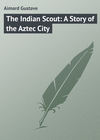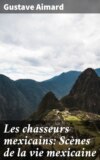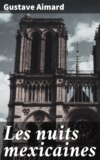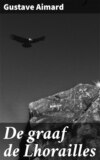Читать книгу: «The Indian Scout: A Story of the Aztec City»
PREFACE
The following work has been the most successful of all Gustave Aimard has published in Paris, and it has run through an unparalleled number of Editions. This is not surprising, however, when we bear in mind that he describes in it his personal experiences in the Indian Aztec city, from which no European ever returned prior to him, to tell the tale of his adventures. From this volume we learn to regard the Indians from a very different side than the one hitherto taken; for it is evident that they are something more than savages, and possess their traditions just as much as any nation of the Old World. At the present moment, when the Redskins appear destined to play an important part in the American struggle, I think that such knowledge as our Author is enabled alone to give us about their manners and customs, will be read with interest.
L. W.
CHAPTER I
THE SURPRISE
It was towards the end of May, 1855, in one of the least visited parts of the immense prairies of the Far West, and at a short distance from the Rio Colorado del Norte, which the Indian tribes of those districts call, in their language so full of imagery, "The endless river with the golden waves."
The night was profoundly dark. The moon, which had proceeded two-thirds of its course, displayed between the lofty branches of the trees her pallid face; and the scanty rays of vacillating light scarce brought out the outlines of the abrupt and stern scenery. There was not a breath in the air, not a star in the sky. A silence of death brooded over the desert – a silence only interrupted, at long intervals, by the sharp barking of the coyotes in search of prey, or the savage miaulings of the panthers and jaguars at the watering place.
During the darkness, the great American savannahs, on which no human sound troubles the majesty of night, assume, beneath the eye of heaven, an imposing splendour, which unconsciously affects the heart of the strongest man, and imbues him involuntarily with a feeling of religious respect.
All at once the closely growing branches of a floripondio were cautiously parted, and in the space thus left appeared the anxious head of a man, whose eyes, flashing like those of a wild beast, darted restless glances in every direction. After a few seconds of perfect immobility, the man of whom we speak left the clump of trees in the midst of which he was concealed, and leaped out on the plain.
Although his bronzed complexion had assumed almost a brick colour, still, from his hunting garb, and, above all, the light colour of his long hair, and his bold, frank, and sharply-marked features, it was easy to recognise in this man one of those daring Canadian wood rangers, whose bold race is daily expiring, and will probably disappear ere long.
He walked a few paces, with the barrel of his rifle thrust forward, and his finger on the trigger, minutely inspecting the thickets and numberless bushes that surrounded him; then, probably reassured by the silence and solitude that – continued to prevail around, he stopped, rested the butt of his rifle on the ground, bent forward, and imitated, with rare perfection, the song of the centzontle, the American nightingale.
Scarce had the last modulation of this song, which was gentle as a love sigh, died away in the air, when a second person bounded forward from the same shrub which had already offered passage to the hunter. It was an Indian; he stationed himself by the Canadian's side, and, after a few seconds' silence, said, affecting a tranquillity probably not responded to by his heart, – "Well?"
"All is calm," the hunter answered. "The Cihuatl can come."
The Indian shook his head.
"Since the rising of the moon, Mahchsi Karehde has been separated from Eglantine; he knows not where she is at this moment."
A kindly smile played round the hunter's lips.
"Eglantine loves my brother," he said, gently. "The little bird that sings in her heart will have led her on the trail of the Chief. Has Mahchsi Karehde forgotten the song with which he called her to his love meetings in the tribe?"
"The Chief has forgotten nothing."
"Let him call her then."
The Indian did not let the invitation be repeated. The cry of the walkon rose in the silence.
At the same moment a rustling was heard in the branches, and a young woman, bounding like a startled fawn, fell panting into the warrior's arms, which were opened to receive her. This pressure was no longer than a flash of lightning; the Chief, doubtlessly ashamed of the tender emotion he had yielded to in the presence of a white man, even though that white man was a friend, coldly repulsed the young female, saying to her, in a voice in which no trace of feeling was visible, "My sister is fatigued, without doubt; no danger menaces her at this moment; she can sleep; the warriors will watch over her."
"Eglantine is a Comanche maid," she answered in a timid voice. "Her heart is strong; she will obey Mahchsi Karehde (the Flying Eagle). Under the protection of so terrible a chief she knows herself in safety."
The Indian bent on her a glance full of indescribable tenderness; but regaining, almost immediately, that apparent apathy which the Redskins never depart from, "The warriors wish to hold a council; my sister can sleep," he said.
The young woman made no reply; she bowed respectfully to the two men, and withdrawing a few paces, she lay down in the grass, and slept, or feigned to sleep. The Canadian had contented himself with smiling, on seeing the result obtained by the advice he had given the warrior, and listened, with an approving nod of the head, to the few words exchanged between the Redskins. The Chief, buried in thought, stood for a few minutes with his eyes fixed, with a strange expression, on the young, sleeping woman; then he passed his hand several times over his brow, as if to dissipate the clouds that oppressed his mind, and turned to the hunter.
"My brother, the Paleface, has need of rest. The Chief will watch," he said.
"The coyotes have ceased barking, the moon has disappeared, a white streak is rising on the horizon," the Canadian replied. "Day will speedily appear; sleep has fled my eyelids; the men must hold a council."
The Indian bowed, without further remark, and, laying his gun on the ground, collected a few armfuls of dry wood, which he carried near the sleeper. The Canadian struck a light; the wood soon caught, and the flame coloured the trees with its blood red hue. The two men then squatted by each other's side, filled their calumets with manachie, the sacred tobacco, and commenced smoking silently, with that imposing gravity which the Indians, under all circumstances, bring to this symbolic operation.
We will profit by this moment of rest, which accident offers us, to draw a portrait of these three persons, who are destined to play an important part in the course of our story.
The Canadian was a man of about forty-five years of age, six feet in height, long, thin, and dry; his was a nervous nature, composed of muscle and sinews, perfectly adapted to the rude profession of wood ranger, which demands a vigour and boldness beyond all expression. Like all his countrymen, the Canadian offered, in his features, the Norman type in its thorough purity. His wide forehead; his grey eyes, full of intelligence; his slightly aquiline nose; his large mouth, full of magnificent teeth; the long light hair, mingled with a few silvery threads which escaped from under his otter skin cap, and fell in enormous ringlets on his shoulders, – all these details gave this man an open, frank, and honest appearance, which attracted sympathy, and pleased at the first glance. This worthy, giant, whose real name was Bonnaire, but who was only known on the prairies by the sobriquet of Marksman, a sobriquet which he fully justified by the correctness of his aim, and his skill in detecting the lurking places of wild beasts, was born in the vicinity of Montreal; but having been taken, while very young, into the forests of Upper Canada, desert life possessed such charms for him, that he had given up civilized society, and for nearly thirty years had traversed the vast solitudes of North America, only consenting to visit the towns and villages when he wanted to dispose of the skins of the animals he had killed, or renew his provision of powder and bullets.
Marksman's companion, Flying Eagle, was one of the most renowned chiefs of the tribe of the White Buffaloes, the most powerful of all forming the warlike Comanche race, that untameable and ferocious nation, which, in its immeasurable pride, haughtily terms itself the Queen of the Prairies, a title which no other tribe dares to challenge. Flying Eagle, though still very young, for he was scarcely four-and-twenty, had already distinguished himself, on several occasions, by deeds of such unheard-of boldness and temerity, that his mere name inspired the countless Indian hordes that constantly traverse the desert in every direction, with invincible terror.
He was tall, well built, and perfectly proportioned; his features were elegant, and his black eyes acquired, beneath the influence of any powerful emotion, that strange rigidity which commands respect; his gestures were noble, and his carriage graceful, and stamped with that majesty inborn in Indians. The Chief was attired in his war dress, and that was so singular, as to deserve a detailed description.
Flying Eagle wore the cap which only distinguished warriors, who have killed many warriors, have the right to assume; it is made of strips of white ermine, with a large piece of red cloth fastened at the back, and falling to the thigh, to which is fastened an upright crest of black and white eagle plumes, which begins at the head, and continues in close order to the extremity. Above his right ear he had passed through his hair a wooden knife, painted red, and about the length of a hand; this knife was the model of one with which he had killed a Dacotah chief; he wore, in addition, eight small wooden skewers, painted blue, and adorned at the upper extremity with a gilt nail, to indicate the number of bullets that had wounded him; over his left ear he wore a large tuft of yellow owl feathers, with the ends painted red, as the totem of the Band of Dogs; one half his face was red, and his body reddish brown, with stripes from which the colour had been removed by a moistened finger. His arms, starting from the shoulder, were adorned with twenty-seven yellow stripes, indicating the number of his exploits, while on his chest he had painted a blue hand, to announce that he had frequently made prisoners. Round his neck he wore a magnificent collar of grizzly bear's claws, three inches in length, and white at the point. His shoulders were covered by a large buffalo robe, falling almost to the ground, and painted of various colours. His breeches, composed of two separate parts, one for each leg, were tightly fastened to his waist belt, and fell almost to his ankles, embroidered externally with coloured porcupine quills, terminating in a long tuft that trailed on the ground. Wide stripes of black and white cloth were rolled round his hips, and fell before and behind in heavy folds. His slippers, of buffalo hide, were but slightly decorated; but wolf tails, trailing on the ground behind him, and equalling in number the enemies he had conquered, were fastened above his ankles. From his waist belt hung, on one side, his powder flask, ball pouch, and scalping knife: on the other, a quiver of panther skin filled with long, sharp arrows, and his tomahawk; his gun was laid on the ground, within reach of his hand.
This warrior, dressed in such a strange costume, had something imposing and sinister about him which inspired terror.
For the present we will confine ourselves to saying that Eglantine was not more than fifteen years of age; that she was very beautiful for an Indian girl; and wore, in all its elegant simplicity, the sweet costume adopted by the women of her nation. Ending here this description, which was perhaps too detailed, but which was necessary in order to know the men we have introduced in the scene, we will return to our narrative.
For a long time the two men smoked side by side without exchanging a syllable; at length, the Canadian shook out the ashes of his pipe on his thumb nail, and addressed his companion.
"Is my brother satisfied?" he said.
"Wah!" the Indian answered, and bowing assent; "my brother has a friend."
"Good!" the hunter continued; "and what will the Chief do now?"
"Flying Eagle will rejoin his tribe with Eglantine, and then return to seek the Apache trail."
"For what purpose?"
"Flying Eagle will avenge himself."
"As you please, Chief. I will certainly not try to dissuade you from projects against enemies who are also mine; still, I do not believe you look at the matter in the right light."
"What would my brother the Paleface warrior say?"
"I mean that we are far from the lodges of the Comanches, and before reaching them we shall have doubtlessly more than one turn-up with the enemies from whom the Chief considers himself freed, perhaps, too prematurely."
The Indian shrugged his shoulders disdainfully.
"The Apaches are old women, chattering, and cowardly," he said. "Flying Eagle despises them."
"That is possible," the hunter replied, with a toss of his head; "still, in my opinion, we should have done better in continuing our journey till sunrise, in order to put a greater distance between them and us, instead of halting so imprudently; we are still very near the camp of our enemies."
"The fire water has stopped the ears and closed the eyes of the Apache dogs; they are stretched on the ground and sleeping."
"Hum! that is not my opinion; I am, on the contrary, persuaded that they are watching and looking for us."
At the same instant, as if chance wished to justify the apprehensions of the prudent hunter, some dozen shots were fired; a horrible war cry, to which the Canadian and the Comanche responded, with a yell of defiance, was heard in the forest, and nearly thirty Indians rushed howling toward the fire, at which our three characters were seated; but the latter had disappeared, as if by enchantment.
The Apaches stopped with an outburst of passion, not knowing in what direction to turn, in order to find their crafty foes again. Suddenly three shots were fired from the interior of the forest, and three Apaches rolled on the ground, with holes in their chests. The Indians uttered a yell of fury, and rushed in the direction of the shots. At the moment they reached the edge of the forest, a man stepped forward, waving in his right hand a buffalo robe, as a signal of peace. It was Marksman, the Canadian.
The Apaches stopped with an ill-omened hesitation, but the Canadian, without seeming to notice the movement, walked resolutely toward them with the slow and careless step habitual to him; on recognizing him, the Indians brandished their weapons wrathfully, and wished to rush upon him, for they had many reasons for hating the hunter; but their Chief arrested them with a peremptory gesture.
"Let my brothers be patient," he said, with a sinister smile, "they will lose nothing by waiting."
CHAPTER II
THE GUEST
On the same day that our story begins, and about three miles from where the events narrated in our preceding chapter occurred, a numerous caravan had halted at sunset, in a vast clearing situated on the skirt of an immense virgin forest, the last species of which ended on the banks of the Rio Colorado.
This caravan came from the south-east, that is, from Mexico. It appeared to have been on the march for a long time, as far as possible to judge by the state in which the clothes of the men were, as well as the harness of the horses and mules. In fact, the poor beasts themselves were reduced to a state of leanness and weakness, which amply testified to the rude fatigue they must have endured. The caravan was composed of some thirty-five persons, all attired in the picturesque and characteristic costume of the half-bred hunters and Gambusinos, who alone, or in small bands, at the most of four, incessantly traverse the Far West, which they explore in its most mysterious depths, for the purpose of hunting, trapping, or discovering the numberless gold veins it contains in its bosom.
The adventurers halted, dismounted, fastened their horses to picket ropes, and began immediately, with that skill and quickness only attained by long habit, making their preparations to bivouac. The grass was pulled up over a considerable extent of ground; the baggage, piled up in a circle, formed a breastwork, behind which a sudden attack of the desert marauders might be resisted; and then fires were lighted in the shape of a St. Andrew's cross in the interior of the camp.
When all this had been attended to, some of the adventurers put up a large tent above a palanquin hermetically closed, which was carried by two mules, one before and one behind. When the tent was pitched, the mules were taken out of the palanquin, and the curtains, in falling, covered it so completely, that it was entirely concealed.
This palanquin was a riddle to the adventurers. No one knew what it contained, though the general curiosity was singularly aroused on the subject of a mystery so specially incomprehensible in this deserted country; each kept carefully to himself the opinions he had formed about it – above all, since the day when, in the midst of a difficult piece of country, and during the momentary absence of the chief of the Cuadrilla, who usually never left the palanquin, which he guarded like a miser does his treasure, a hunter leaned over and slightly opened one of the curtains; but the man had scarce time to take a furtive peep through the opening, ere the chief, suddenly coming up, split his skull open with a blow of his machete, and laid him dead at his feet. Then he turned to the terrified witnesses, and said calmly, – "Is there another among you who would like to discover what I think proper to keep secret?"
These words were uttered in such a tone of implacable raillery and furious cruelty, that these villains, for the most part without faith or law, and accustomed to brave, with a laugh, the greatest perils, felt an internal shudder, and their blood stagnated in their veins. This lesson had been sufficient. No one tried afterwards to discover the captain's secret.
The final arrangements had been scarcely made for the encampment, ere the sound of horses was heard, and two horsemen arrived at a gallop.
"Here is the Captain," the adventurers said to each other.
The newcomers gave their reins to men who ran up to receive them, and walked hastily toward the tent. On arriving there, the first stopped and addressed his companion: – "Caballero," he said to him, "you are welcome among us; although very poor ourselves, we will gladly share the little we possess with you."
"Thanks," the second said, with a bow, "I will not abuse your gracious hospitality; tomorrow, at sunrise, I think I shall be sufficiently rested to continue my journey."
"You will act as you think proper: seat yourself by this fire prepared for us, while I go for a few moments into that tent. I will soon rejoin you, and have the honour of keeping you company."
The stranger bowed, and took his place by the fire, lighted a short distance from the tent, while the captain let the curtain he had lifted fail behind him, and disappeared from his guest's sight.
The latter was a man of marked features, his stalwart limbs denoting a far from ordinary strength; the few wrinkles that furrowed his energetic face served to indicate that he had already passed midlife, though no trace of decrepitude was visible on his solidly-built body, and not a white hair silvered his long and thick locks, which were black as a raven's wing. He wore the costume of the rich Mexican hacenderos, that is to say, the mança; the zarapé, of many colours; the velvet calzoneras, open at the knee, and botas vaqueras; his hat, of vicuna skin, gallooned with gold, was drawn in by a rich toquilla, fastened with a costly diamond; a sheathless machete hung from his right hip, merely passed through an iron ring: the barrels of two six-chambered revolvers shone in his waist belt, and he had thrown on the grass by his side an American rifle, beautifully damascened with silver.
When the Captain left him alone, this man, while installing himself before the fire in the most comfortable way possible, that is to say, arranging his zarapé and water bottles to serve as a bed, if necessary, had cast a furtive glance around, whose expression would, doubtless, have supplied the adventurers with serious matter of thought had they been able to notice it; but all were busied in getting the bivouac snug, and preparations for supper; and trusting entirely in the loyalty of prairie hospitality, they did not at all dream of watching what the stranger seated at their fire was about.
The unknown, after a few moments' reflection, rose and walked up to a party of trappers, whose conversation seemed very animated, and who were gesticulating with that fire natural to southern races.
"Eh!" one of them said, on noticing the stranger, "this señor will set us right with a word."
The latter, thus directly appealed to, turned toward the speaker.
"What is the matter, caballeros?" he asked.
"Oh, a very simple matter," the adventurer made answer; "your horse, a noble and handsome animal, I must allow, señor, will not associate with others; it stamps its feet and bites at the companions we have given it."
"Oh, that is, indeed, simple enough," a second adventurer remarked, with a grin; "that horse is a costeño, and too proud to associate with poor tierras interiores like our horses."
At this singular reason, all burst into an Homeric laugh. The stranger smiled cunningly.
"It may be the reason you state, or perhaps some other," he said gently; "at any rate, there is a very simple way of settling the dispute, which I will employ."
"Ah!" the second speaker said, "what is it?"
"This," the stranger replied, with the same air of placidity.
Then, walking up to the horse, which two men had a difficulty in holding, he said, – "Let go!"
"But if we let go, nobody knows what will happen."
"Let go! I answer for all then," addressing his horse, – "Lillo!" he said.
At this name, the horse raised its noble head, and fixing its sparkling eye on the man who had called it, with a sharp and irresistible movement, it threw off the two men who tried to check it, sent them rolling on the grass, to the shouts of their comrades, and rubbed its head against its master's chest with a neigh of pleasure.
"You see," the stranger said, as he patted the noble animal, "it is not difficult."
"Hum!" the first adventurer who picked himself up said, in an angry tone, and rubbing his shoulder; "that is a demonio to which I would not entrust my skin, old and wrinkled as it is at present."
"Do not trouble yourself any further about the horse, I will attend to it."
"On the faith of Domingo, I have had enough, for my part; 'tis a noble brute, but it has a fiend inside it."
The stranger shrugged his shoulders without replying, and returned to the fire, followed by his horse, which paced step by step behind him, not evincing the slightest wish to indulge further in those eccentricities which had so greatly astonished the adventurers, who are, however, all men well versed in the equine art. This horse was a pure barb of Arab stock, and had probably cost its present owner an enormous sum, and its pace seemed strange to men accustomed to American horses. Its master gave it provender, hobbled it near him, and then sat down again by the fire: at the same instant the Captain appeared in the entrance of the tent.
"I beg your pardon," he said, with that charming courtesy natural to the Hispano-Americans; "I beg your pardon, Señor Caballero, for having neglected you so long, but an imperative duty claimed my presence. Now, I am quite at your service."
The stranger bowed. "On the contrary," he replied, "I must ask you to accept my apologies for the cool manner in which I avail myself of your hospitality."
"Not a word more on this head, if you wish not to annoy me."
The Captain seated himself by his guest's side.
"We will dine," he said. "I can only offer you scanty fare; but one must put up with it, and I am reduced to tasajo and red beans with pimento."
"That is delicious, and I should assuredly do honour to it if I felt the slightest appetite; but, at the present moment, it would be impossible for me to swallow the smallest mouthful."
"Ah!" the Captain said, looking distrustfully at the stranger.
But he met a face so simply calm, a smile so frank, that he felt ashamed of his suspicions, and his face, which had grown gloomy, at once regained all its serenity.
"I am vexed. Still, I will ask permission to dine at once; for, differently from you, Caballero, I must confess to you that I am literally dying of hunger."
"I should be in despair at causing you the slightest delay."
"Domingo," the Captain shouted, "my dinner."
The adventurer, whom the stranger's horse had treated so roughly, soon came up limping, and carrying his chief's supper in a wooden tray; a few tortillas he held in his hand completed the meal, which was worthy of an anchorite.
Domingo was an Indian half-bred, with a knowing look, angular features, and crafty face: he appeared to be about fifty years of age, so far as it is possible to judge an Indian's age by his looks. Since his misadventure with the horse, Domingo felt a malice for the stranger.
"Con su permiso," the Captain said, as he broke a tortilla.
"I will smoke a cigarette, if that can be called keeping you company," the stranger said, with his stereotyped smile.
The other bowed politely, and fell to on his meagre repast with that eagerness which denotes a lengthened abstinence. We will take advantage of the opportunity to draw for the reader a portrait of the chief of the caravan.
Don Miguel Ortega, for such was the name by which he was known to his comrades, was an elegant and handsome young man, not more than six and twenty years of age, with a bronzed complexion, delicate features, haughty and flashing eyes; while his tall stature, well-shaped limbs, and wide and arched chest, denoted rare vigour. Assuredly, through the whole extent of the old Spanish colonies, it would have been difficult – if not impossible – to meet a more seductive cavalier, whom the picturesque Mexican costume became so well, or combining to the same extent as he did, those external advantages which charm women and captivate the populace. Still, for the observer, Don Miguel had too great a depth in his eye, too rude a frown, and a smile too false and perfidious, not to conceal, beneath his pleasing exterior, an ulcerated soul and evil instincts.
A hunter's meal, seasoned by appetite, is never long. The present one was promptly disposed of.
"There," the Captain said, as he wiped his fingers with a tuft of grass; "now for a cigarette to help digestion, and then I shall have the honour to wish you good night. Of course, you do not intend to leave us before daybreak."
"I can hardly tell you. That will depend, to some extent, on the weather tonight. I am in a considerable hurry, and you know, Caballero, that – as our neighbours, the Gringos, so justly remark – time is money."
"You know better than I do, Caballero, what you have to do. Act as you please; but, before I retire, accept my wishes for a pleasant night's rest, and the success of your plans."
"I thank you, Caballero."
"One last word, or rather, one last question before separating?"
"Ask it."
"Of course, if this question appears to you indiscreet, you are at perfect liberty not to answer it."
"It would surprise me, on the part of so accomplished a Caballero. Hence, be kind enough to explain yourself."
"My name is Don Miguel Ortega."
"And mine, Don Stefano Cohecho."
The Captain bowed.
"Will you allow me, in my turn," the stranger said, "to ask you a question?"
"I beg you to do so."
"Why this exchange of names?"
"Because, on the prairie it is good to be able to distinguish friends from foes."
"That is true. And now?"
"Now I am certain that I do not count you among the latter."
"¿Quién sabe?" Don Stefano retorted, with a laugh. "There are such strange accidents."
The two men, after exchanging a few more words in the most friendly manner, cordially shook hands. Don Miguel went into the tent, and Don Stefano, after turning his feet towards the fire, slept, or pretended to do so.
An hour later, the deepest silence reigned in the camp. The fires only produced a doubtful gleam; and the sentinels, leaning on their rifles, were themselves yielding to that species of vague somnolency, which is not quite sleep, but is no longer watching. All at once, an owl, probably hidden in a neighbouring tree, twice uttered its melancholy hu-hu.
Don Stefano suddenly opened his eyes, without changing his position; he assured himself, by an investigating glance, that all was quiet around him; then, after convincing himself that his machete and revolvers had not left him, he took up his rifle, and in his turn imitated the cry of the owl, which was answered by a similar whoop.
The stranger, after arranging his zarapé, so as to imitate a human body, whispered a few words to his horse while patting it, in order to calm it; and laying himself at full length on the ground, he crawled towards one of the outlets from the camp, stopping at intervals to look around him.
All continued to be tranquil. On reaching the foot of the breastwork formed by the baggage, he jumped up, leapt over the obstacles with a tiger's bound, and disappeared in the prairie. At the same instant a man rose, sprang over the entrenchment, and rushed in pursuit of him.
That man was Domingo.
Покупайте книги и получайте бонусы в Литрес, Читай-городе и Буквоеде.
Участвовать в бонусной программе



















